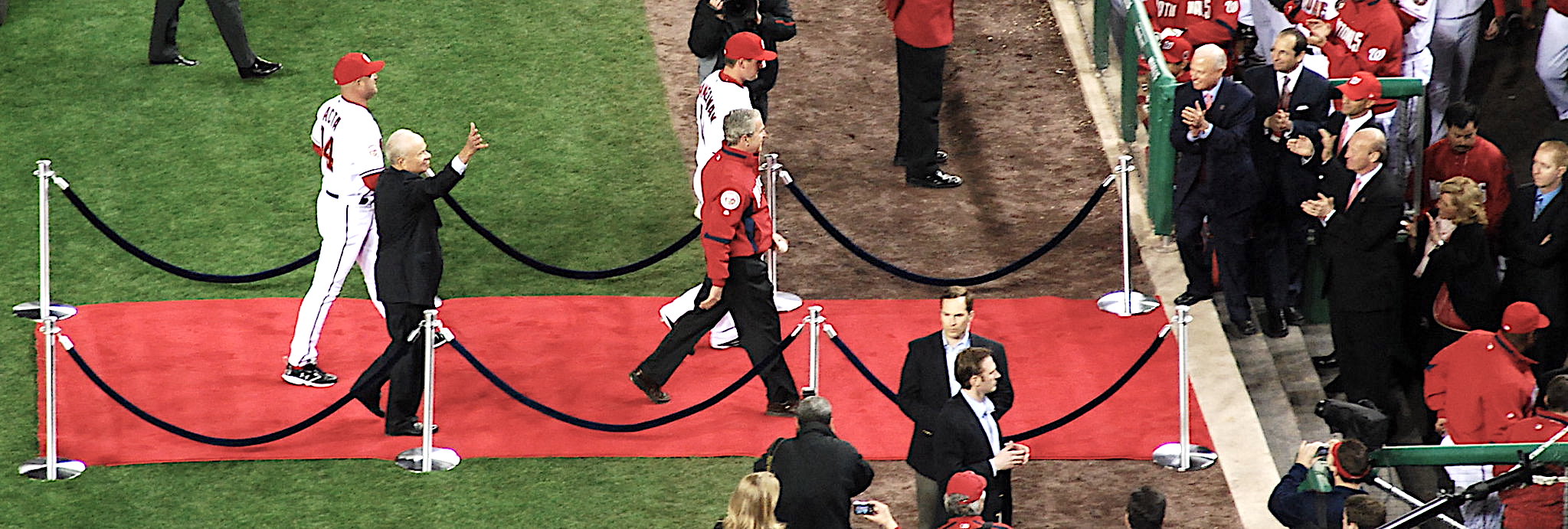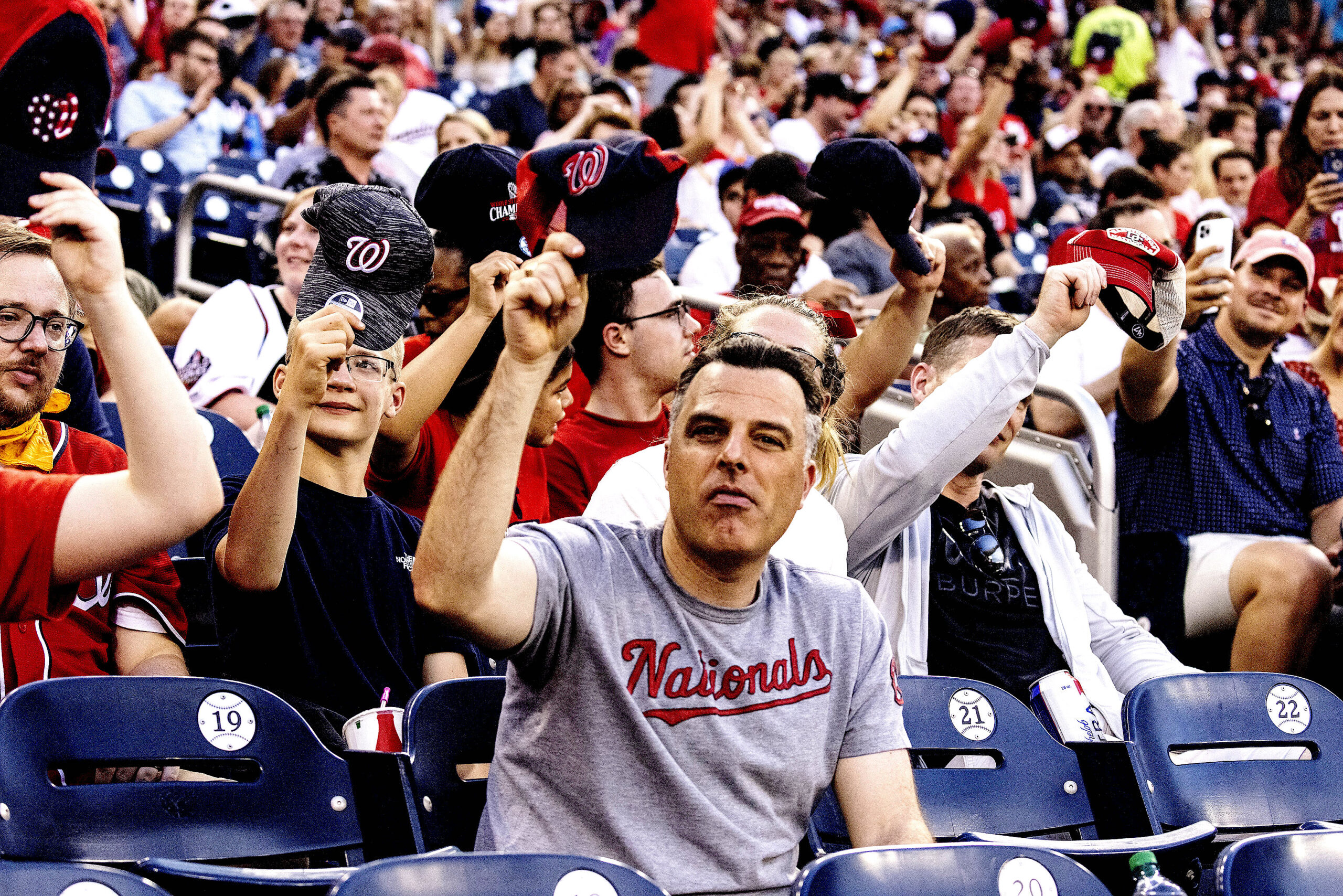Sam Pizzigati says the intense concentration of wealth in the U.S. over the past 50 years has fundamentally altered the sport’s landscape.

Juan Soto at the plate at Nationals Park, July 4, 2021. (All-Pro Reels, CC BY-SA 2.0, Wikimedia Commons)
By Sam Pizzigati
Inequality.org
 The game of baseball’s most preternatural young talent, the 23-year-old Juan Soto, has just exited his original team. The Washington Nationals traded him away last week after the young superstar’s agent nixed a 15-year, $440-million contract offer.
The game of baseball’s most preternatural young talent, the 23-year-old Juan Soto, has just exited his original team. The Washington Nationals traded him away last week after the young superstar’s agent nixed a 15-year, $440-million contract offer.
Soto now figures to snare a substantially larger deal when he hits free-agent status in 2024. His agent, holds the baseball industry scuttlebutt, wants Soto to be the first ballplayer to bust past the sport’s $500-million barrier.
A little financial perspective: The family fortune of the 96-year-old billionaire Nats owner, Ted Lerner, has so far this year jumped by $365 million, according to the Bloomberg Billionaires Index. In just seven months, the Lerner clan has amassed most of what Soto’s agent wants for the rest of his client’s entire career. The Lerners currently have the Nats up for sale. They’ll almost certainly collect over $2 billion when a sale finalizes, well over quadruple the $450 million they paid for the team 16 years ago.
Baseball has always, of course, had wealthy team owners. But the intense concentration of wealth in the United States over the past 50 years has fundamentally altered the sport’s landscape.

March 30, 2008: President George W. Bush, right on red carpet, returns to the Nationals dugout after throwing out the ceremonial first pitch, followed by team owner Ted Lerner, waving. (Adam Fagen, Flickr, CC BY-NC-SA 2.0)
Back in the much more equal America of the mid-20th century, owners and fans had a somewhat mutually dependent relationship. Rich people might own baseball’s franchises, the industry’s movers and shakers understood, but their teams — to be successful — had to belong to their fans. A franchise simply could not flourish, the conventional wisdom assumed, without support from average families.
That assumption no longer holds. In the exceedingly unequal America that emerged in the 1980s, the economy no longer revolves around average households. In this new America, income and wealth tilt precipitously toward the top, and owners tilt that way, too. Today’s owners no longer covet the average fan. The average fan spends only average money. The real money, in our much more unequal America, sits in affluent pockets.
Franchise owners have been moving heaven and earth to pick those pockets. A great deal of earth. Bulldozers and backhoes have reconfigured American sports. Deluxe new ballparks have been rising up all across the United States.
Sports Palaces
These new sports palaces — almost always bankrolled with taxpayer subsidies of one sort or another — have replaced stadiums that still had years of useful life ahead. But the older facilities served a different America. They lacked what owners now crave: luxury accommodations for America’s affluent. Ballparks that can’t be reconfigured to prominently position luxury seating have simply become obsolete.
Easily affordable seats, in the meantime, have essentially disappeared. Analysts at the Team Marketing Report started tracking a “Fan Cost Index” in the 1990s. These analysts have been calculating how much a typical family of four spends for a day or a night out at the ballpark, including everything from average-price tickets and souvenir caps to hot dogs and parking. By 2002, families were paying an average $145 to watch a Major League Baseball game in person. The latest tally: an average $256.

Nationals fans, 2021. (All-Pro Reels, Flickr, CC BY-SA 2.0)
Numbers like these are changing the fan experience. Fans, acting in emotional self-defense, have become consumers. They no longer see sports through the same emotional lens.
“Instead of hoping that your team wins, you begin to demand it,” as sportscaster Bob Costas has noted. “It’s like you bought a car and if it doesn’t work, you want to know why. When a team doesn’t win, instead of disappointment or heartbreak, you now have anger and resentment.”
Meanwhile, at the other end of the pro sports spectrum, a new ownership class now dominates. Team owners a half century ago certainly rated as rich, but not nearly as rich as today’s billionaire owners. These billionaires see themselves as superstars and credit their business success to their personal superstar status. Success in sports, they assume, must work the same way. Get your team some superstars!
But billionaires can’t simply buy success on the ball field. Ball clubs owe their success, year in and year out, much more to team camaraderie than individual performance, as Matt Bloom, a management expert at the University of Notre Dame, has documented. Bloom subjected nine years’ worth of baseball salary and performance data to close analysis. His key finding?
“The bigger the pay difference between a team’s stars and scrubs,” as The Wall Street Journal summed up Bloom’s findings, “the worse its record.”
“Money makes those who pay it resentful and impatient and makes those who receive it feel guilty or inadequate,” the now retired ace sportswriter Thomas Boswell once lamented.
“Maybe, someday,” Boswell went on to muse, “baseball will attract a core of owners with a sense of balance in their expectations.”
Do we have an alternative to simply yearning for a better class of super-rich owners? We sure do. Imagine how good sports could be if we had a society with no super rich at all.
Sam Pizzigati co-edits Inequality.org. His latest books include The Case for a Maximum Wage and The Rich Don’t Always Win: The Forgotten Triumph over Plutocracy that Created the American Middle Class, 1900-1970.
This article is from Inequality.org.
The views expressed are solely those of the authors and may or may not reflect those of Consortium News.

Kleptocrats rule by bribery of the elected officials. Naturally we are the land of Oligopoly and Monopoly and the blue collar factory worker was destroyed by sending his/her factories to foreign countries all over the planet; the Kleptocrats pocketing Rosie-The-Riveter and Joe Lunchbox’s whole living and way of life.
Well, movies and movie stars, too. Pop stars of any kind. CEOs. Senators, Congresspersons, Governors. Police chiefs, city managers, school board superintendents. My wife takes an eye drug, Lumigan, to keep from going blind. The patent for Lumigan ran out years ago and it was required to go generic, but Allergan had enough pull to get Congress to pass an exception. So it runs around 200.00 month w/o insurance. This country is stupid. Don’t buy music, sports tickets, or watch movies, your life will be much richer w/o all that crap.
I haven’t seen a major league game since Tiger Stadium closed. I am sure I didn’t pay a lot to see Mark Fidrych pitch that opener.
I’ve seen the MudHens in Toledo and once the Lugnuts in Lansing. Now I just boycott all sports as too expensive and with the CTE of football and hockey, I’ve lost respect for fans of them, not much different from the horror of boxing.
Sports? A business venture like any other. That is why I stopped watching ‘sports’ of any sorts.
Crazy.
Everyone knows that its a general rule in America that it is far, far cheaper to buy the officials than it is to buy talent.
I actually thought this would be about the players who are a bit overpaid. Incredibly, the insane salaries of many players are overlooked here. You mention Juan Soto, and then promptly move on. How is that kind of money justified? It can’t be justified in a democracy. I’ve done the math, and many, many players make thousands of dollars PER DAY, every day, 365 days a year, no matter what. For years on end. Do you think that this does not affect ticket prices? I went into a chat forum at a sports site once, after some young player signed a big deal. EVERY SINGLE COMMENTER was outraged over the money, yet the writer of the column didn’t see a problem at all. Was the deal fair? The outrageous amount of the deal overall and its implications didn’t matter at all to the sports writer. So yeah, I get that the owners are making out like bandits, but the system allows the players to gain fabulous, obscene wealth too. This huge disparity in wealth is a sign of a sick society. (I believe the yearly compensation for a rookie is $750,000, a sum that is staggering itself to the vast majority of working people.)
The sad fact still is that sport is dominated by those who have most money to spend. It is a miracle nowadays if some minor club has success. Of course some big money clubs also fail because everbody cannot win at the same time.
I have lost my interest in sports because of this big money phenomenon and really i hate all those spoiled drug and gaming addicted young millioinare players with their fancy cars and rolexes.
If you simply look at the stadiums, you can see the obvious difference.
It used to be that they build big stadiums that could seat lots of people and sell lots of tickets. In 1941, the original Yankee Stadium could hold over 70,000 people for a baseball game. The current Yankee Stadium has a capacity of 46,000. Cleveland Stadium was built with an original capacity of 78,000 in 1932. The current Cleveland ballpark (‘the house the Flo built’?) holds just over 34,000 people.
I watched a lot of big league baseball, live and in person, back when I was in college. In those days, one could pay $3 or $5 to get a seat in the outfield, and then watch and enjoy a baseball game. I watched a very enjoyable pennant race from those cheap seats in the outfield.
Its those cheap outfield seats, the ‘bleachers’, that have been removed from today’s ballparks. What have they been replaced with? Pretty scenery, and dancing water fountains, for the people in the expensive seats to look at. Modern baseball stadiums cater to the rich, and its the only people they really seem to want to attend. Now, a college kid could never afford to go over to the stadium after class and regularly watch baseball. At least not a hillbilly kid like me, I’m sure there are trust-fund babies who can afford it. Maybe some of the privileged kids can go watch baseball, but not the kid from Appalachia.
It is very clear that baseball only wants the rich. The architecture screams this louder than a bad announcer.
Which is one of the reasons why this kid who used to be a baseball freak who always wanted to watch a game, now hasn’t seen a game in years. Not even on TV, not even between the Lexus commercials between every pitch and the Rolex scoreboard announcements of the other scores in the league.
Looks like Rome in the last days. I found myself thinking would it not be better if they gave the final score at the beginning? Why do I turn in to a game to see who loses? Not a fan of Dallas since that cracker from Arkansas took over, I just turn into the 10 o’clock news to see how bad they were beaten. I remember a house full glued to the “small” set, beer and chips, watching every move the teams made. My wife”, not a big FB fan, could name every QB on every team. and the name of every stadium. I couldn’t name one player on the Dallas team and they are just up the road. Not much going on since the immaculate reception!
Coincidently, I’m attending tonight’s SF Giants game for free. My Ladyfriend is active in the Brady Campaign (gun control) and the Giants gave them a block of tickets. I haven’t been to {insert sponsor’s name here} Park, since my brother bought me a ticket to the game commemorating the Grateful Dead’s 50th anniversary. But unlike Shoeless Joe, I am able to watch a lot of college baseball.
What interesting food for thought. As a closer follower of European soccer, where similar financial trends are happening, I wonder whether these same mechanisms explain the curious unevenness of some top team performance. I’m thinking in particular of Manchester United, who with the most expensive team roster seem nowadays to struggle to score goals and win games, with occasional jaw dropping on field team lapses.
Manchester United have been destroyed by greedy American owners, the Glazer family. They have not invested a penny in the club but via dividends, interest and other payments, cost the club about 2 billion. Before they arrived, the club was the best in England and top 3 in Europe, with the best stadium and training ground in England, wonderful academy set up and debt free. Now the club has hundreds of millions of debt loaded on the club, a rotting stadium. outdated training ground, and is barely mid table. The Glazers fire the coach every 2-3 years, spend money on vanity signings to boost shirt sales, and overpay for players that do not fit the next coach’s playing style. A tragic tale of untold greed that is destroying a magical name in sports.
I think there is a problem with “professional sport”. While I don’t oppose professional sport it is m long held opinion that it has a destructive effect at many levels.
Someone once remarked that “sport is a game and children play games”. So do adults.
Today sport, at many levels, is a business and profit is its core.
To participate in sport (any sport) is a wonderful thing and it is more wonderful if it is not taken too seriously.
There is nothing wrong in taking it seriously, competing and wanting to win but there should be a balance and for too many competitors the red line is professional competition (not everyone can be a winner).
Wealthy egotists and professionalism has had many an adverse effect. Fewer people participate as they are discouraged from sport early in life as poor or average participant are ignored and those that stand out are mentored and encouraged.
This is a topic that needs more public discussion. I have deviated from the main topic of the article and believe there are many issues here that are relevant.